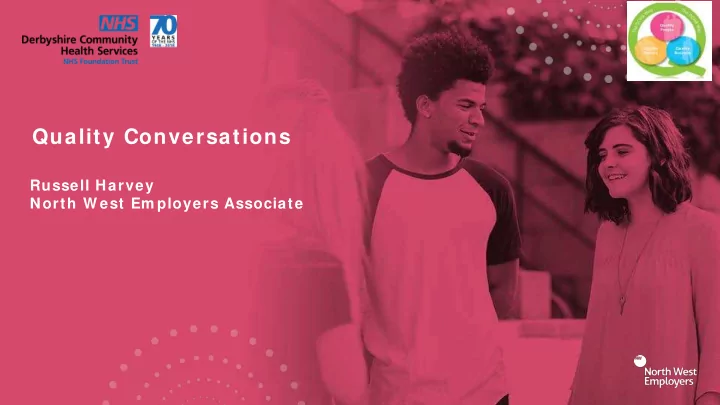

Quality Conversations Russell Harvey North W est Em ployers Associate
Purpose of Programme • to support and develop our staff to maximise the health outcomes of their interactions with patients • to improve the quality of interactions between staff within our organisations and across the health and care system
Purpose of Programme Jayne Needham - Assistant Director Health, Wellbeing and Inclusion/ Consultant in Public Health Derbyshire Community Health Services NHS Foundation Trust. Jo Hunter – Deputy Chief Nurse Derbyshire Community Health Services NHS Foundation Trust.
Learning Outcomes • Clarify the meaning(s) of Quality Conversations • Identify the skills, capabilities required • Specify how these link to you, your team and your clients/ colleagues • Through practice – identify your own strengths around Coaching • Outline and practice a Coaching model • Provide you with a suite of tips, tools, techniques and models to utilise • Agree next steps and action planning
Contracting A successful session includes… .? How do I… .?
Menti login: www.menti.com – code: 94 07 66
What makes you proud about the service you provide? Strengths? Skills? Capabilities?
Menti login: www.menti.com – code: 94 07 66
A strengths based approach “What will happen when we think about what is right with people rather than fixating on what is w rong with them?”
Strengths v Deficit Deficit Strengths • Identify gaps • Build strengths and capacity • Repair problems • Release potential • Fosters culture of negativity • Focus on the client's story • Study what is wrong with people • Study what is right with people
Health coaching in action.
Pull ( Non- directive) Supporting them to solve Questions to explore options/ solutions Sum m arising, paraphrasing, reflecting Listening to understand Giving feedback Offering guidance Solving I nstructing for them Telling Push ( Directive)
What are strengths based conversations? • Complex and messy • Focus on understanding and building strengths • They have many good outcomes • They focus on the client’s story • They value and appreciate the individual, their culture and community
Attitude, Skills and Knowledge For a successful Coach Attitude Skills Knowledge
Practice Observer Coach Coachee
The Psychological Dimension Conversations to enable sustainable change External and Action landscapes
Both Landscapes: External Places Money Role People Events Deadlines Data Relationships Action Beliefs emotions/ feelings desires images dreams values conflicts thoughts Physical sensations psychological/ self protection
Are you listening to respond or listening to understand?
The GROW Model Goals Reality Will Options
Six principles of coaching People know more than they think they know Everyone has resources for improving performance Useful questions are worth more than commands Each person is responsible for their own contribution to the organisation Every setback provides a learning opportunity Challenging but achievable goals bring out the best in people
Great coaching questions Should not Should • Challenge assumptions • Lead them where you think and thinking they should go • Encourage a • Confuse the individual broader/ different view • Reinforce existing unhelpful • Lead to a deeper level of thinking thinking
Practice Observer 1 Coach Coachee Observer 2
The core statement framework • Introduce the conversation 1 • Say exactly what you saw or heard 2 • Explain the effect of this behaviour 3 • Pause/discuss 4 Core statement • Expectations – state the behaviour you want 5 • Ask for agreement 6 • Conclude and agree outcomes 7
Understanding your audience High Shining Star Grumpy Steady Eddie Expert Skill Can’t cook, Won’t Eager Novice cook! Low High W ill
Setting the right tone High Grow th S Com placen Learning U t Change P Cosy club Motivation P O Apathy R Fear Boredom T Stress De- m otivation Low High CHALLENGE 25
Practice Observer 1 Coach Coachee Observer 2
What are your next steps? How are you going to ensure success? Strengths? Skills? Capabilities?
Menti login: www.menti.com – code: 94 07 66
Website link: https: / / my.dchs.nhs.uk/ Public/ DCHS-Quality- Conversations
Contacts NorthWest Employers Suite 2.4, 2 nd floor Building 8 Exchange Quays Salford Quays Manchester M5 3EJ 0161 834 9362 support@nwemployers.org.uk nwemployers.org.uk
Recommend
More recommend